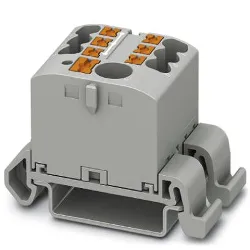| Company: | Xingtai Shanfeng special rubber products Co., Ltd |
| Location: | China - Hebei,Hetou Industrial Zone, Renze District, Xingtai City, Hebei Province |
| Price: | 1.15/PCS |
| Contact: | 刘俊英(Salesperson) |
| Contact Me: |
Mobile:+86-13290595892 |
Wholesale Universal Oil Seals Custom Different Colored Oil Seals
In the realm of machinery, oil seals are critical components that ensure the smooth operation of various equipment. One of the intriguing aspects of oil seals is their color. This article aims to shed light on the purpose of different colored oil seals and their significance.
Oil seals come in a variety of colors, including black, brown, green, and blue, among others. At first glance, these colors might seem like a mere aesthetic choice. However, they serve a much more practical purpose. The color of an oil seal often indicates the material from which it is made.
Black and brown oil seals, for instance, are typically made from Nitrile Butadiene Rubber (NBR). NBR is a popular material for oil seals due to its excellent resistance to petroleum-based oils and fuels. Therefore, if you come across a black or brown oil seal, it’s likely to be made from NBR.
Green and blue oil seals, on the other hand, are usually made from Fluoroelastomer (FKM). FKM is known for its outstanding resistance to heat and chemicals, making it suitable for harsh conditions. Therefore, green and blue oil seals are often used in applications involving high temperatures or aggressive chemicals.
It’s important to note that while color can be a useful indicator of the material, it should not be the sole determinant. Other factors, such as the specifications provided by the manufacturer, should also be considered to confirm the material of the oil seal.
The color of oil seals is more than just a visual element. It provides a quick and easy way to identify the material of the oil seal, thereby giving an indication of its properties and potential applications. By understanding the purpose of different colored oil seals, one can make more informed decisions when selecting and using oil seals.

Disclaimer:All information is provided by registered users. You may assess risks based on corresponding qualifications.
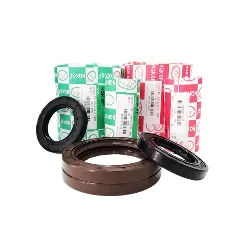 China Factory Wholesale Price Rubber Shaft Oil Seal NQK·SF Oil Seal
China Factory Wholesale Price Rubber Shaft Oil Seal NQK·SF Oil Seal
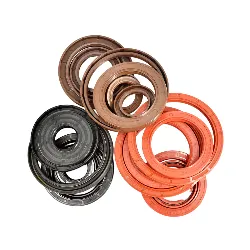 NQK SF Factory Direct Sale Framework Oil Seals NBR FKM Rubber Shaft Seal
NQK SF Factory Direct Sale Framework Oil Seals NBR FKM Rubber Shaft Seal
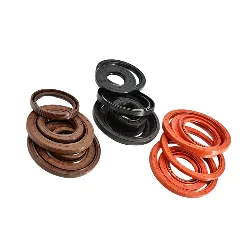 Made in China Factory Supply High Pressure Oil Seals NBR FKM FPM Shaft Seal
Made in China Factory Supply High Pressure Oil Seals NBR FKM FPM Shaft Seal
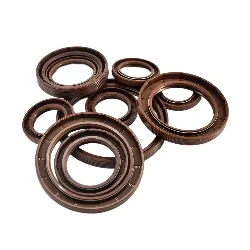 Wholesale Customized NBR FKM Rubber Shaft Seal High Pressure Industry Oil Seals
Wholesale Customized NBR FKM Rubber Shaft Seal High Pressure Industry Oil Seals
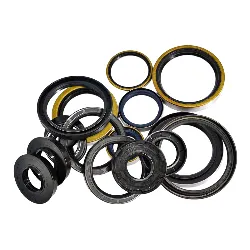 High Abrasion Resistance Double Lips Oil Seal NBR FKM Shaft Seal
High Abrasion Resistance Double Lips Oil Seal NBR FKM Shaft Seal
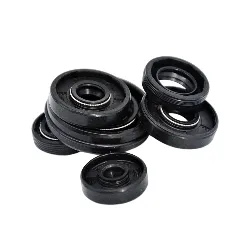 High Quality Cars Oil Seal NBR FKM Wear Resistant Skeleton Oil Seal
High Quality Cars Oil Seal NBR FKM Wear Resistant Skeleton Oil Seal
![PTFIX 6 12X2,5-NS35A BU - Distribution block]() PTFIX 6 12X2,5-NS35A BU - Distribution blockPTFIX 6/12X2,5-NS35A BU - Distribution block 3273222 Distribution block , Block with horizontal alignment and integrated supply , nom ." "
PTFIX 6 12X2,5-NS35A BU - Distribution blockPTFIX 6/12X2,5-NS35A BU - Distribution block 3273222 Distribution block , Block with horizontal alignment and integrated supply , nom ." "![PTFIX 6 12X2,5-NS35A RD - Distribution block]() PTFIX 6 12X2,5-NS35A RD - Distribution blockPTFIX 6/12X2,5-NS35A RD - Distribution block 3273224 Distribution block , Block with horizontal alignment and integrated supply , nom ." "
PTFIX 6 12X2,5-NS35A RD - Distribution blockPTFIX 6/12X2,5-NS35A RD - Distribution block 3273224 Distribution block , Block with horizontal alignment and integrated supply , nom ." "![PTRV 4-PV、RD - Potential distributors]() PTRV 4-PV、RD - Potential distributorsPTRV 4-PV /RD - Potential distributors 3270246 Potential distributors , nom ." "
PTRV 4-PV、RD - Potential distributorsPTRV 4-PV /RD - Potential distributors 3270246 Potential distributors , nom ." "![PTRV 4-PV、BU - Potential distributors]() PTRV 4-PV、BU - Potential distributorsPTRV 4-PV /BU - Potential distributors 3270247 Potential distributors , nom ." "
PTRV 4-PV、BU - Potential distributorsPTRV 4-PV /BU - Potential distributors 3270247 Potential distributors , nom ." "

